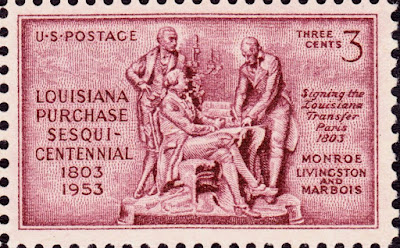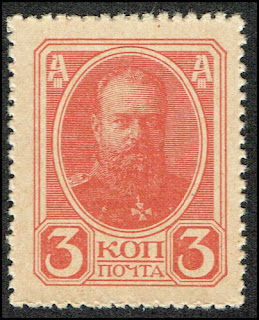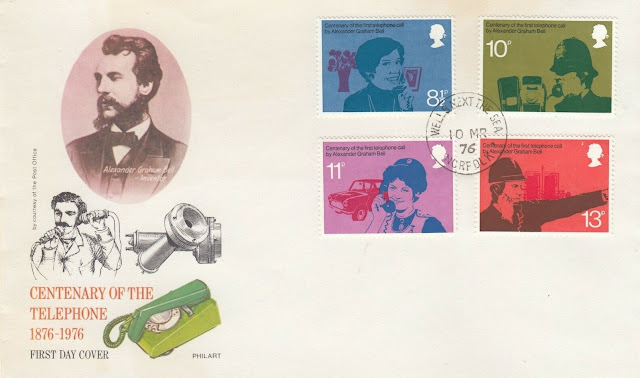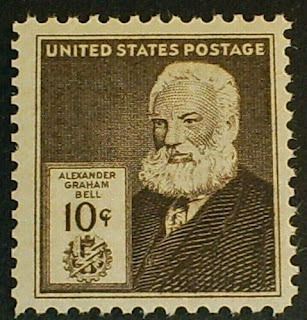1804 – Louisiana Purchase: In St. Louis, Missouri, a formal ceremony is conducted to transfer ownership of the Louisiana Territory from France to the United States.
The Louisiana Purchase (French: Vente de la Louisiane 'Sale of Louisiana') was the acquisition of the territory of Louisiana by the United States from France in 1803. In return for fifteen million dollars, the U.S. acquired a total of 828,000 sq mi (2,140,000 km2; 530,000,000 acres). The treaty was negotiated by French Treasury Minister François Barbé-Marbois (acting on behalf of Napoleon) and American delegates James Monroe and Robert R. Livingston (acting on behalf of President Thomas Jefferson).
The Kingdom of France had controlled the Louisiana territory from 1699 until it was ceded to Spain in 1762. In 1800, Napoleon, then the First Consul of the French Republic, regained ownership of Louisiana as part of a broader project to re-establish a French colonial empire in North America. However, France's failure to put down a revolt in Saint-Domingue, coupled with the prospect of renewed warfare with the United Kingdom, prompted Napoleon to consider selling Louisiana to the United States.
Here are some US stamps and a First Day Cover depicting the Louisiana Purchase

1845 Born: Alexander III of Russia (d. 1894)
Alexander III (10 March 1845 – 1 November 1894) was Emperor of Russia, King of Poland and Grand Duke of Finland from 13 March 1881 until his death on 1 November 1894. He was highly reactionary and reversed some of the liberal reforms of his father, Alexander II. Under the influence of Konstantin Pobedonostsev (1827–1907) he opposed any reform that limited his autocratic rule. During his reign, Russia fought no major wars; he was therefore styled "The Peacemaker"
In 1894, Alexander III became ill with terminal kidney disease (nephritis). Maria Fyodorovna's sister-in-law, Queen Olga of Greece, offered her villa of Mon Repos, on the island of Corfu, in the hope that it might improve the Tsar's condition. By the time that they reached Crimea, they stayed at the Maly Palace in Livadia, as Alexander was too weak to travel any further. Recognizing that the Tsar's days were numbered, various imperial relatives began to descend on Livadia. Even the famed clergyman John of Kronstadt paid a visit and administered Communion to the Tsar. On 21 October, Alexander received Nicholas's fiancée, Princess Alix, who had come from her native Darmstadt to receive the Tsar's blessing. Despite being exceedingly weak, Alexander insisted on receiving Alix in full dress uniform, an event that left him exhausted. Soon after, his health began to deteriorate more rapidly. He died in the arms of his wife, and in the presence of his physician, Ernst Viktor von Leyden, at Maly Palace in Livadia on the afternoon of 1 November 1894 at the age of forty-nine, and was succeeded by his eldest son Tsesarevich Nicholas, who took the throne as Nicholas II. After leaving Livadia on 6 November and traveling to St. Petersburg by way of Moscow, his remains were interred on 18 November at the Peter and Paul Fortress.
1876 – The first successful test of a telephone is made by Alexander Graham Bell.
Alexander Graham Bell (March 3, 1847 – August 2, 1922) was a Scottish-born American inventor, scientist, and engineer who is credited with inventing and patenting the first practical telephone. He also co-founded the American Telephone and Telegraph Company (AT&T) in 1885.
Alexander Graham Bell is the inventor of the first practical telephone. The classic story of him saying "Mr. Watson, come here – I want to see you" is a well-known part of the history of the telephone. This March 10, 1876 test, between two rooms in a single building in Boston showed that the telephone worked, but so far, only at a short range. Bell was the first to obtain a patent, in 1876, for an "apparatus for transmitting vocal or other sounds telegraphically", after experimenting with many primitive sound transmitters and receivers.
This instrument was further developed by many others. The telephone was the first device in history that enabled people to talk directly with each other across large distances. Telephones rapidly became indispensable to businesses, government and households.
Many other inventions marked Bell's later life, including groundbreaking work in optical telecommunications, hydrofoils, and aeronautics. Although Bell was not one of the 33 founders of the National Geographic Society, he had a strong influence on the magazine while serving as the second president from January 7, 1898, until 1903.
Beyond his scientific work, Bell was an advocate of compulsory sterilization, and served as chairman or president of several eugenics organizations.
Stamps from the United States and Great Britain depicting Alexander Graham Bell






No comments:
Post a Comment